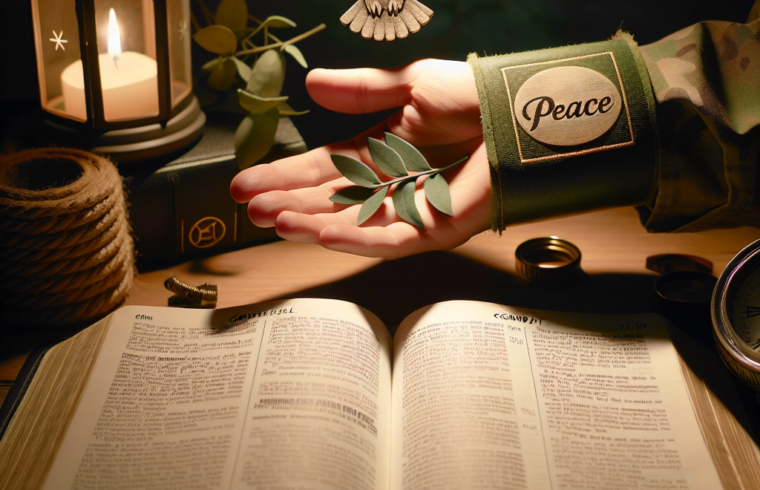==> Thank you for reading this post! Click Here If you are looking for support and Victory over PTSD.
Finding Peace in Scripture
The Power of the Word
Let me tell you, there’s something incredibly grounding about turning to Scripture, especially when you’re feeling overwhelmed by the all-too-familiar weight of PTSD. I’ve found that just immersing myself in the Psalms or the comforting words of Jesus has helped me navigate my toughest days. The Bible offers more than just beautiful verses; it gives poems and prayers that speak directly to our hearts.
On days when my mind races with images from the past, reciting verses like Isaiah 41:10 has become my lifeline: “Don’t be afraid, for I am with you.” It’s a reminder that I’m not alone, that even in the darkest moments, there’s someone watching over me. The more I meditate on these passages, the more I feel a sense of peace wash over me.
I encourage anyone dealing with similar struggles to identify passages that resonate with your experience. Write them down, carry them with you, and don’t hesitate to repeat them out loud. It can be a transformative practice that brings a little light into even the darkest times.
Community Support
The Importance of Fellowship
You know, when I first started grappling with PTSD, I hid away from everyone. I thought I could manage it on my own. But boy, was I wrong! The moment I allowed myself to lean on my community, everything shifted. I found that surrounding myself with people who understood or even just offered a listening ear made a real difference.
Getting involved with a support group, whether it’s at church or in a local community center, has been a game changer. Sharing experiences, coping strategies, and just showing up for each other can build a connection that heals. It’s like finding a family who gets it, and that camaraderie can lift so much of the burden from your shoulders.
Don’t shy away from asking for help or reaching out to friends. You’d be surprised how many people want to support you but don’t know how until you let them in. Opening up takes courage, but the relief you feel once you do is truly worth it.
Prayer and Reflection
The Power of Conversation with God
Prayer, for me, has been one of the most profound ways to cope with PTSD. I think of it as an open line of communication directly with God. Whether I’m pouring out my fears, my anger, or even my gratitude, I find a sense of release with every word. It’s like unburdening my soul.
Sometimes, I talk to God as I would a friend, sharing the raw, real stuff. Other times, I just sit quietly, listen, and wait for that gentle nudge of reassurance. Spending time in prayer has taught me that it’s not about perfection; it’s about presence. God wants to hear every thought and feeling.
I also find keeping a prayer journal helps. Writing down my thoughts and prayers creates a space for introspection, and I can often look back and see how I’ve grown and how God has moved in my life. It’s like keeping a record of hands lifted, burdens eased, and faith strengthened.
Casting Burdens
Letting Go of Weight
One of the most freeing things I’ve learned in my journey with PTSD is how important it is to cast my burdens onto God. I remember being burdened by guilt and shame; it felt so heavy that I could barely take a step. But learning to relinquish that weight has been key to my healing process.
Get Support and Help with Recovery! Visit us for more Information and Support
There’s that verse in 1 Peter 5:7 that says, “Cast all your anxiety on him because he cares for you.” This idea of letting go was tough at first—like, really tough! But the more I practiced it, the lighter I felt. Literally, visualize handing over those burdens to God during prayer; it’s a tangible way to release what you can’t carry alone.
Surrendering doesn’t mean ignoring your feelings or struggles; instead, it’s recognizing that you don’t have to tackle them alone. God is there to shoulder some of that weight, making the journey just a bit more bearable.
Seeking Professional Help
The Value of Therapy
While all of these spiritual practices are invaluable, there’s no shame in seeking professional help too. When the emotional and psychological toll feels too heavy, talking to a mental health professional can be a critical part of healing. I sought help during my hardest days, and it was honestly a game changer.
Therapists can offer coping skills and strategies tailored specifically to your experience with PTSD. They help you process the trauma in a way that’s constructive and think through the best coping strategies without feeling overwhelmed. I learned that it’s okay to ask for that support.
Therapy combines with my spiritual practices beautifully. It’s not a replacement for prayer or community; it’s a complement. I found that being proactive in therapy while remaining grounded in my faith has given me a much better chance at managing my PTSD day by day.
Frequently Asked Questions
1. What are some specific scriptures to read for comfort during PTSD?
Some comforting scriptures include Isaiah 41:10, Psalm 34:18, and Philippians 4:6-7. These verses remind us of God’s presence and peace.
2. How can I encourage others in my community who are struggling with PTSD?
Listen actively and let them know you are there for support. Encourage them to seek help and offer to join them in any faith-related activities, like prayer or reading Scripture together.
3. Is it okay to combine spiritual practices with therapy?
Absolutely! Many find that their spiritual practices can enhance the therapeutic process, offering a holistic approach to healing.
4. How can I start journaling for my spiritual growth?
Begin by selecting a quiet space and setting a regular time each day to write. Record your thoughts, prayers, and reflections on scripture, allowing your thoughts to flow without judgment.
5. What if I don’t feel comfortable talking to others about my PTSD?
It’s completely okay! Take your time. You might start by writing down your feelings or talking to God in prayer. When you’re ready, consider reaching out to a trusted friend or professional; just take it step by step.













